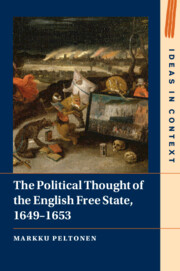Book contents
- The Political Thought of the English Free State, 1649–1653
- Ideas in Context
- The Political Thought of the English Free State, 1649–1653
- Copyright page
- Dedication
- Contents
- Acknowledgements
- Introduction
- Chapter 1 Changing the Form of Government
- Chapter 2 Anti-monarchism
- Chapter 3 The Free State
- Chapter 4 Aristocracy
- Chapter 5 Democracy
- Epilogue
- Bibliography
- Index
Chapter 2 - Anti-monarchism
Published online by Cambridge University Press: 13 October 2022
- The Political Thought of the English Free State, 1649–1653
- Ideas in Context
- The Political Thought of the English Free State, 1649–1653
- Copyright page
- Dedication
- Contents
- Acknowledgements
- Introduction
- Chapter 1 Changing the Form of Government
- Chapter 2 Anti-monarchism
- Chapter 3 The Free State
- Chapter 4 Aristocracy
- Chapter 5 Democracy
- Epilogue
- Bibliography
- Index
Summary
The central theme of Chapter 2 is anti-monarchism. The chapter shows that during the free state monarchy was widely thought to be the worst form of government. Monarchy entailed tyranny and the concomitant slavery of the people. However, an even more powerful anti-monarchical argument rose to prominence during the free state. Based largely on 1 Samuel 8, numerous advocates of the free state maintained that monarchy was against God and thus both idolatrous and sinful. Already in early December 1648, a radical pamphlet, Light shining in Buckingham-shire, equated kingship with the devil. But the argument that monarchy was a sin and idolatry became particularly vociferous during the Engagement controversy. It was argued repeatedly that monarchy, as a form of government, was against God’s express will. Such an argument led to the conclusion that monarchy was finished in England and would soon be so elsewhere in Europe as well.
Keywords
- Type
- Chapter
- Information
- The Political Thought of the English Free State, 1649–1653 , pp. 69 - 109Publisher: Cambridge University PressPrint publication year: 2022

